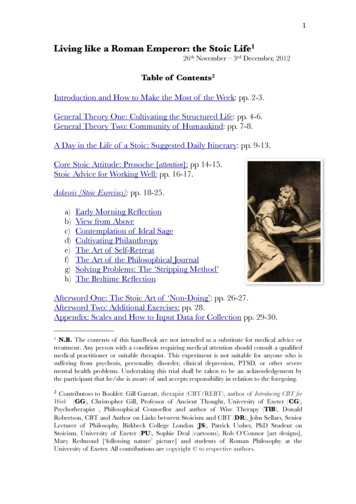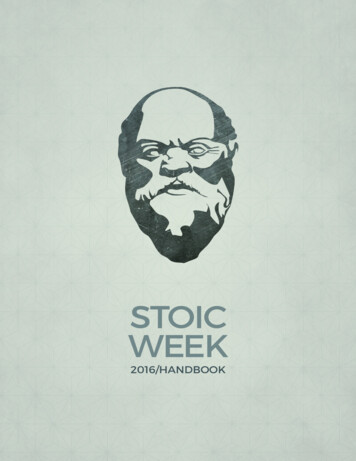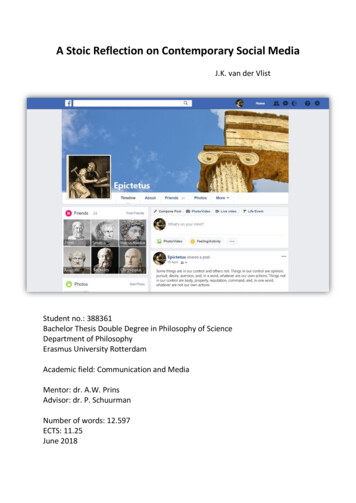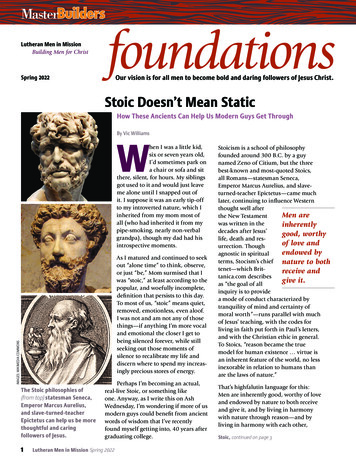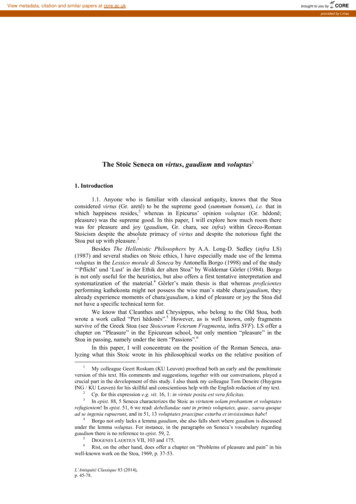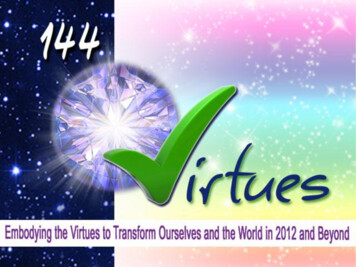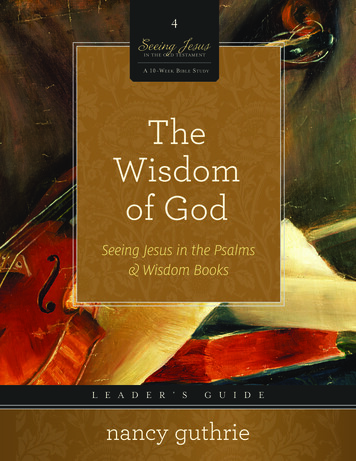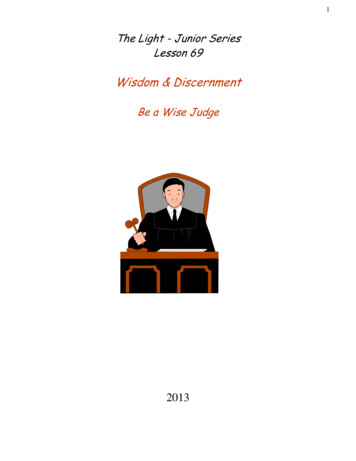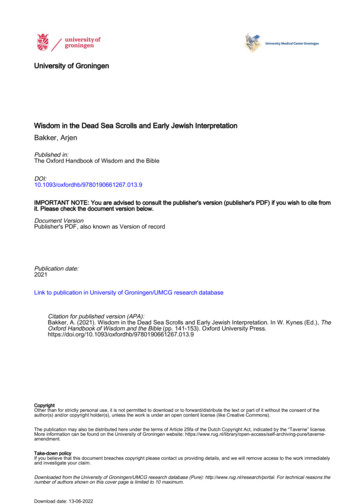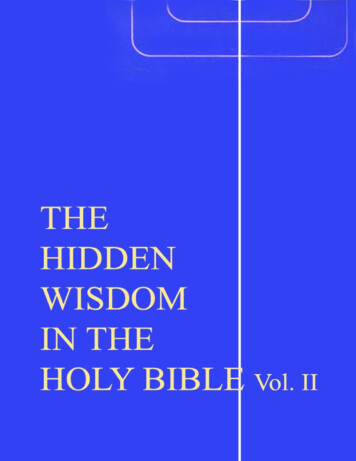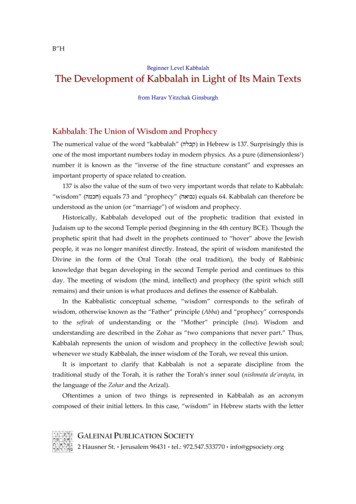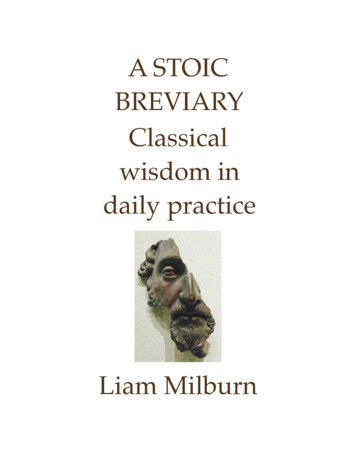
Transcription
A STOICBREVIARYClassicalwisdom indaily practiceLiam Milburn
Liam Milburn asserts his right to be recognized under all existingcopyright laws and regulations as author of all original contentin A Stoic breviary: Classical wisdom in daily practice. 2017 Liam Milburnstoicusok@gmail.com17512
Oh dear Pan, and all the other gods of this place,Grant that I may be beautiful inside.Let all my external possessionsBe in friendly harmony with what is within.May I consider the wise man to be rich.As for gold,Let me have as much as a moderate man could bearAnd carry with him.—Socrates’ Prayer, Plato, Phaedrus 279c, tr Jowett If you work at that which is before you, following right reason seriously, vigorously,calmly, without allowing anything else to distract you, but keeping your divine partpure, as if you should be bound to give it back immediately; if you hold to this,expecting nothing, fearing nothing, but satisfied with your present activity according toNature, and with heroic truth in every word and sound which you utter, you will livehappy.And there is no man who is able to prevent this.—Marcus Aurelius, Meditations Book 3, tr Long FOR ICS,WITHOUT WHOM THIS BOOK WOULD NEVER HAVE BEEN POSSIBLE.YOU ARE ALWAYS LOVED. !3
!4
PrefaceI think it important to say exactly what this book on Stoicism isn’t, before explaining what it is.Though I am by vocation and profession a teacher of philosophy and the humanities, this is not ascholarly text. It is not intended as a tool for academic research, and it makes no claims toadvancing scholarship on the study of the Stoic philosophers.Over the years I have learned exactly how little I know about even the things I am supposed toknow, so I would not dare to presume such a role.While never intending to “dumb down” the content of Stoicism, I try to present the material in away that any thoughtful and curious reader can hopefully appreciate.I also do not wish to ignore some of the more precise, complex, technical questions of logic,metaphysics, or cosmology considered by many of the Stoics, but I do believe this book shouldfirst and foremost be an introduction to the basic ethical approach of the Stoic school.A text on other necessary and more advanced topics may be for another time and place, and mostlikely for a writer more skilled than myself.This is also most certainly not a book in psychology, and I would dissuade you from using it inplace of proper psychological care. Though I study and teach on many matters relating to the fieldof psychology, I am not qualified to tell you anything about your own mental health. I refer you toesteemed professionals in the field for such assistance.Likewise, though I will reference my own health in this text, don’t confuse anything here withsound medical advice. When you want your taxes done, you don’t go to an auto mechanic, and ifyou need medical advice, you certainly don’t go to a philosophy professor.It is also not a book arguing for a certain type of new–fangled therapy, or any type of simplisticself–help model. Our world is sadly too full of the sound and fury of trendy advice, most of itsignifying nothing.I have no desire to join in the clamor of diet plans, get-rich-quick schemes, or formulas for instanthappiness. Only you are the source of your own happiness, and there is no quick, or even easy,solution.And by no means am I preaching about religion or social matters. We have enough clerics andpoliticians to do that for us, a very few who are noble, most who are rotten. They already havetheir reward. It usually involves our money finding its way into their pockets.Where does that leave us? If this book won’t make you a better philosopher, cure your neuroses oryour acne, won’t make you happy in the next sixty days, or send you to straight to heaven, whyshould you bother reading it?I can only offer one, and one seemingly insignificant, answer. I am a human being, a person likeyou. Despite all the differences we may have, of class, race, creed, religion, or politics, every one ofus shares that same nature. It is our common bond.!5
What I have written isn’t a formal treatise, or a work of research, or a handbook, or a set ofinstructions. It’s just the honest reflection of a single human being, facing the obstacles, the pains,and the doubts that I suspect each and every one of us faces each and every day. This book simplyasks you to consider your humanity, and what that may mean.And I do this in light of a tradition in philosophy, very ancient, but also completely timeless, calledStoicism. It is a way of thinking, and more importantly, a way of living that saved my life. That iswhat this book is about. !6
Introduction“Stoic” is one of those unfortunate words that has changed its meaning over the years, andconsequently gets a bum rap. Whenever I hear it used these days, it almost invariably signifies aperson who is cold, emotionless, or willing to heartlessly suffer without complaint. It is seen as anattitude of toughness, the stiff upper lip, the get-over-it mentality, and an approach that stressesstrength over sympathy.This is sadly something of a misunderstanding. The true Stoic, Classically understood, is a personwho looks to a love of the natural order of all things as a first guide. He seeks to live with Nature,and never against it. He recognizes how his own happiness is a part of the whole order of things,and he understands that his reason and freedom exist within that whole.He doesn’t merely meet suffering and misfortune with denial, but sees the opportunity for thegood in all things. He knows that he chooses how to live, and that his environment does not rulehim. He does not allow his life to depend upon his circumstances, but bases his well being uponhis own wisdom and moral character.Finally, and I think most importantly, he never closes himself off to others. Knowing that hispractice of virtue and excellence are the very purpose for his existence, he loves and cares for hisfellows without condition.It is only by his concern for the good of others, that he becomes good himself. Far from being coldand emotionless, he finds the greatest and deepest joy in the love of all things.These things are easy to say. They are also hard to do. And I would suggest that the mostimportant things in life are precisely the things that are most difficult. Whatever is worthwhilerequires effort to achieve.These are attitudes and ideas that have been present throughout all of human history, in both theEast and the West. And I claim, with no apology, that this is because they are true. A Christian, aBuddhist, a Muslim, a Hindu, and even an Atheist can all agree on many of these principles,precisely because they speak to our shared humanity. !7
The formal school of Stoicism was founded by Zeno of Citium (c 334–262 BC), and takes its namefrom the public space in Athens where he taught. He was, in turn, succeeded by Cleanthes ofAssos (c 330–c 230 BC), and Chrysippus of Soli (c 279–206 BC) as heads of the school.Sadly, no complete texts from this Early Period or the Middle Period of Stoicism survive. We knowonly of their teachings from fragments and the accounts of others, most importantly the 3rdcentury AD work The lives and opinions of eminent philosophers by Diogenes Laertius.Thankfully, we have richer resources available in the writings of the Roman Late Period ofStoicism, including the great figures of Seneca the Younger (c 4 BC–65 AD), Musonius Rufus (c 20AD–c.100 AD), Epictetus (50 AD–135 AD), and Emperor Marcus Aurelius (121 AD–180 AD). Thougheclectic in his philosophy, many of the ideas and values of Cicero (106 BC–43 BC) also have amarkedly Stoic character.While a dominant philosophical movement in the Roman period, often in tension with Skepticismand its chief rival, Epicureanism, Stoicism gradually faded from fashion in the Christian era. Evenso, its influence is profound and perennial.Though traditional scholarship stresses Neo-Platonic influences as primary in the early Christianphilosopher Boethius, I would argue that his Stoic roots are equally important. Accordingly, Ialways consider his wonderful Consolation of Philosophy to be an honorary Stoic text. That is why Iinclude his excerpts in this book, with no apology.The Stoics studied a wide range of topics, and divided their work into three disciplines: logic,physics, and ethics. As this book primarily concerns the search for the good life, my stress is ontheir model of ethics, though related elements on the nature of human reason and order of thenatural world will obviously come into play as well.In recent years one can discern a slightly renewed interest in Stoicism, and not merely as anacademic exercise, but as a practice of daily living. I believe this to be its great and unique appeal,as it speaks not only to our abstract reflection but also to our immediate choices and actions.This is, I think, all the more important in our own time, where there is an urgent need to findmeaning and purpose in a world where people are more closely connected through industry andtechnology, but often seem more separated from one another morally and spiritually.Many of us know the experience of feeling completely alone in a city of a million, or even of manymillions, of being surrounded by people with whom we have no real connections. And ourcontemporary world, so full of noise, images and so much that is artificial, has never been moreremoved from Nature. !8
I came to Stoicism fairly late in my own philosophical wanderings. My first love was for thephilosophy of St Thomas Aquinas. Always able to distinguish the different senses of the meaningand depth of a wide scope of traditions, he was a master at integrating a variety of insights into agreater and harmonious whole, discerning how all things proceed from and return to their Divinesource.St Thomas is still the philosopher who speaks most to my intellect. Over time, Blaise Pascal becamethe philosopher who spoke most deeply to my heart. But in the end, it has been the Stoics, andparticularly the Meditations of Marcus Aurelius, that help me most in how to live.I suspect that if I had been groomed in Stoic thinking and practice earlier in my life, I wouldprobably have become a much better, and therefore happier, person than I now am. And even so,what little sense of character I may now have is certainly much due to even this late influence.My first indirect introduction to the Stoic values of self-reliance in the face of Fortune camethrough Boethius’ Consolation, and this planted the seeds for my slow but certain embrace of thisway of life.It is because Stoicism has had such a positive and profound effect on my way of thinking andliving that I feel called to share it, in however humble and insufficient a way, with others. !9
My own journey has had many twists and turns.I will refer to a few of them as examples in this book, as Stoic practice has helped me in so manydifferent ways.But most importantly, and so central to my own life, has been how it has been an aid in fightingwhat I refer to, with a nod to two of my heroes, Samuel Johnson and Winston Churchill, as the“Black Dog”.Call it what you will, melancholy, dejection, a sadness of life, existential despair, or by its medicalname, clinical depression. Those who have not been cursed to suffer the Black Dog may find ithard to understand or relate to, but it is a state of heart and mind that goes far beyond feelingdown or low. The sufferer often rightly feels frustrated when others refer to a simple bad mood asbeing “depressed”.It is a type of sadness, a severe hopelessness, a misery that seems to consume the possibility of anyjoy. The extreme pain even takes on a powerful physical form. And it cannot simply be wishedaway when one is advised to “get over it” or “move on”.I again wish to remind the reader that I do not suggest the practice of Stoicism as any sort ofreplacement for medical, or psychological, or spiritual help where it is truly needed. But it can bea philosophical supplement, an aid, a potent weapon in a varied arsenal to help restore a sense ofjoy. The Black Dog only really showed himself fully to me in early adulthood. I had always been aquiet, shy, and reflective child, and, having unusual likes and interests, I was often alone. I wasawkward, ungainly, unattractive, and never really liked by my peers. Books and daydreamingwere often my best friends. But at that time I still had a firm hope that, one day, everything wouldsomehow work out fine.When I went to college, I was immediately surprised by love. And I fell very hard. I hadn’t beenexpecting it, and I honestly didn’t think I had any right to it. But my bond with another person,slowly but surely, became the glue that bound my life together. All my thoughts, feelings, dreamsand plans revolved around this single star. I didn’t know what the future would hold, but I couldnot imagine it without my truest and dearest friend.It wasn’t all roses. She struggled to suffer my insecurities and my foul temper. I struggled to bearher problems with honesty and fidelity. We were an odd pair, but we became seeminglyinseparable.As the years passed, I sensed malaise. For some reason, I was becoming bitter, lazy, cynical, andintemperate.I started drinking far too much, and found myself in the company of toxic friends. We were bothincreasingly adrift, and losing the direction given by a moral compass. Being the sadly reflectiveperson I am (my parents had already jokingly called me “the little philosopher” when I was aninfant) I struggled to take a personal inventory.!10
I made an immediate and firm decision to do some major rebuilding, to commit to living a morehealthy and virtuous life, and to rededicate myself to my vocation as a teacher. And the centralpart of the effort was that I would confirm my devotion to the love of my life.I hatched the big romantic plan. I intended to meet her at Church on a Sunday morning, and thensurprise her with the usual falling to one knee. I had nothing better or fancier to offer than myunconditional love, an empty wallet, and my grandmother’s old engagement ring.Here is where things went tragically wrong. Only a few weeks earlier she had told me she wantednothing more than for us to spend our lives together, and I still believed her.Nevertheless, always the insecure pessimist, I had prepared myself for the very likely possibility ofa refusal, and I steeled myself to accept this if it came to pass. I would, at least, have given it mybest. I loved her for her sake, and I always will, regardless of whether she fancied me.But I had not prepared myself for something much darker. She wasn’t at Church as expected, andwhen I walked the few blocks to her new apartment I found that she wouldn’t answer her door,even as she peeked through the blinds.She had spent the night with another man, someone I at the time considered a friend.The romantic loss was far outweighed by the sense of being deceived and abandoned by thefriend I loved beyond all else.The pain was overwhelming, and compounded threefold: the emptiness of losing the persondearest to me, the shame of having allowed myself be so foolishly deceived for so long, and theagony of rejection and betrayal.Always the hopeless romantic at heart, I would often think of Bogart from In a Lonely Place: ‘I wasborn when she kissed me. I died when she left me. I lived a few weeks while she loved me.’This is when the Black Dog started to walk by my side. It was the trigger, the occasion for most ofwhat followed. He’s been there ever since. From that point on, there always seemed to be something broken in me. It was like a physicalwound or injury that never heals quite right, and always causes crippling pain.A psychiatrist I deeply respect surprised me by diagnosing me, many years later, with PostTraumatic Stress Disorder, something I assumed was for soldiers, not jilted and cuckolded lovers.And every other occurrence, every good or bad fortune, always seemed to link back to thatdefining event. It was never a deliberate choice, but an immediate and seemingly uncontrollableinstinct.It often became so severe that any memory, any place, any person or life event would end upleading me straight to that pain. At times my temperament would improve, but the overalldirection became one of a gradual decline.!11
The reader who is already familiar with Stoicism will perhaps recognize where the problem lay,though I did not see it at the time. My own thinking was on some days rooted in deep resentment,and a sense that I had been wronged. At other times it also took a form where I felt that Iinevitably deserved the pain as a penance for my sins.Whatever the case, the common theme was simply that I had unwittingly made my happiness ormisery entirely dependent on things that were outside of me.I had already started that early on, when I made the value of my own life contingent only upon thesupport of another person.The love I felt turned out not to be enough of a love of giving, and too much of a love of needing;the problem wasn’t that I was living according to love, but in that I was requiring the love ofanother for living. And when I lost that person, I was also lost, and I moved between being tossedand swayed by anger or guilt.There were far too many times when I put a noose around my neck, or a .45 in my mouth. I willnever be so vain as to claim that I defeated those instincts out of any virtue. I only avoided takingmy own life out of fear, and the pain it would cause my family.This destructive habit of thinking spread out and attached itself to most every other aspect of mylife. If I faced conflict in my work, I was immediately moved to resentment or despair. When Itried to form relationships with others, I would assume insincerity by default. When I latersuffered problems with my health, I could think of nothing good to struggle onward for.When my wife and I lost our first child, that same pattern seemed to impose itself. The loss musteither be a grave injustice or a deserved punishment, and I allowed that pain alone to determinemy life. I cried for hours sitting alone in my car, and broke many parts of that poor vehicle when Ilashed out in anger.If Stoicism has a cardinal sin, this is it, as we will soon see. If I choose to make my life depend uponthings that are beyond my control, I become not the master of my life, but a slave to mycircumstances.The daily practice of Stoicism has been a necessary part of my ability not only to survive, but alsoto live well. I still stumble and fall, all of the time, but now I get up again. And I know this isworth doing, because Nature has given me all the tools that I need to be happy. That is a joyous,wondrous, and beautiful thing. !12
A few words are in order on the format and structure of this book.I call it a breviary, not in the specific sense of a book of prayers, but in the broader sense of theLatin word breviarium, a collection, abridgment, anthology, or compendium.It is like an old-school primer.I have chosen brief passages from Stoic thought that have been of great assistance in my ownphilosophical recovery.That there are 365 such passages in this book is of no deeper significance than that it allows thereader to meditate on them over a complete year.I then follow the passage with a brief reflection, based on my own thoughts and experiences.They may or may not appeal to you, and you may or may not agree with them, but the good to begained here, is I think, your own willingness to wrestle with these same questions, and in yourown way.Don’t fight me, or the original author, but fight yourself.In some cases, I imagine that the reflection may be very specific to my own situation, and for that Ido apologize.Simply skip the ones that don’t speak to you, and embark upon your own reflection.At times you may see a repetition of concepts and values.I may repeat something to help myself and build my habits.Pass over it, if it’s not your thing.As is often said at a variety of self-help meetings, “Take what you need, and leave the rest.”They can be read in order or out of order, though in some cases I assume that the content of anearlier passage will help with the comprehension of a later one.You can also read this book quickly or slowly, though I have personally found that Stoicism, likeany strong medicine, is best taken in small doses.Finally, your interest may be one of simple curiosity, or perhaps, as it was for me, out of an urgentneed for comfort.The depth and completeness with which you read the book, whether it be browsing or deepmeditation, should follow your own situation.In my later years, my own habits have involved sitting down every morning, right after rising, andwell before dawn, but before the work of the day begins, to read a Stoic passage.I try to keep it to a single primary theme, and then I use that theme to help me during the daywhen I find conflict, sadness, anger, or loneliness.Almost invariably, in ways I could not have predicted, the Stoic wisdom for that day has aprofound effect.By changing my thinking, I can change my living.The direct sections from Epictetus are usually right to the point, and while profound, present Stoicwisdom in a very immediate form.I turn to Marcus Aurelius, whose writing I find more personal and reflective, when I sense the daywill be especially challenging.And I turn to Seneca when I have the luxury or the need for a more extended and closelyreasoned train of thought.!13
I find Musonius Rufus the most emotionally comforting, as I see him as a very sympathetic writer.The short fragments, sadly small in number, of the Early and Middle Period can serve like a quickenergy shot, and on the fringes of the Stoic tradition Boethius is my guide when I’m feeling moremetaphysical, and certain passages from Cicero when I long for soaring rhetoric. !14
Finally, I offer a few words on sources.The original texts are, of course, in Greek and Latin.Different English translations are available, all with their own distinct merits.In this book, I draw from older, classic translations, mainly from the late 19th and early 20thcenturies.I do this for two reasons.First, aesthetically—and I am eccentric in this regard—I prefer the dignity of such an older style,which I find is especially suitable for Stoic thought.Second, on a purely practical level, this project began as an informal way to distribute Stoic texts tofriends and colleagues at little or no cost, and using works now in the public domain avoided anyentanglements or expenses associated with copyright law.I choose to continue that tradition in this version.Wherever the English seems too archaic, I will sometimes very slightly alter the wording, butnever the meaning, of the text, to speak most directly to a modern reader.This is, again, not a work of formal scholarship, but one of personal reflection.If you are inspired by Stoic wisdom, I encourage you to pursue a more in–depth interest in thetradition, and consult the wide variety of secondary sources available.Yet I suggest that, most of all, Stoicism only really matters if you use it in your own life.Think of this Stoic Breviary more as a primer, or a set of readings to get your feet wet.If it is to your liking, I hope to soon find you swimming in the deep end.Because I am a Stoic, you are my fellow citizen of the world, and my friend, even if I have nevermet you. !15
!16
Day 1Of all existing things some are in our power, and others are not in our power. In our powerare thought, impulse, will to get and will to avoid, and, in a word, everything which is ourown doing.Things not in our power include the body, property, reputation, office, and, in a word,everything which is not our own doing.Things in our power are by Nature free, unhindered, and untrammeled; things not in ourpower are weak, servile, subject to hindrance, dependent on others.Remember then that if you imagine that what is naturally slavish is free, and what isnaturally another’s is your own, you will be hampered, you will mourn, you will be put toconfusion, you will blame gods and men.But if you think that only your own belongs to you, and that what is another’s is indeedanother’s, no one will ever put compulsion or hindrance on you, you will blame none, youwill accuse none, you will do nothing against your will, no one will harm you, you willhave no enemy, for no harm can touch you.—Epictetus, Enchiridion 1, tr MathesonIf there was ever a single, concise mission statement for Stoicism, I think this would have to be it.It’s not a terribly difficult concept to understand, at least in theory, but it can be a very difficult setof values to live in practice.It certainly felt difficult, if not impossible, to me, since so many of us are so completely bound upwith the conditions and circumstances of our lives.Our families, or careers, our education, our friends and social standing, our health, our wealthand property, even our appearance, are seen as defining us.Though we may feel ashamed to acknowledge it, these are the standards we are given to accept asa default.It is hard to think without them.The distinction is clear enough.We are in control of some things, our thoughts, our choices, and our own actions.These things are free of outside limitations, if we only so decide.We are not in control of other things, the circumstances of our world, wealth, power, honor, theactions of others, even our own bodies.By relying on such things, we become enslaved to them, ironically by that same power ofdecision.Now would it ever make sense to have happiness to depend on something uncontrollable?This is why we become miserable, complain, blame others, and even blame God for our state ofaffairs.Yet if we rely only on what belongs to us, we will be in want of nothing.It isn’t that the things outside of us have no value in themselves, but they have value in relation toour happiness only if we learn to use them to aid us in wisdom and virtue, and never as ahindrance to them. !17
Day 2Begin the morning by saying to yourself, I shall meet with the busy-body, the ungrateful,arrogant, deceitful, envious, unsocial. All these things happen to them by reason of theirignorance of what is good and evil.But I who have seen the nature of the good that it is beautiful, and of the bad that it is ugly,and the nature of him who does wrong, that it is akin to me, not only of the same blood orseed, but that it participates in the same intelligence and the same portion of the divinity, Ican neither be injured by any of them, for no one can fix on me what is ugly, nor can I beangry with my kinsman, nor hate him,For we are made for cooperation, like feet, like hands, like eyelids, like the rows of the upperand lower teeth. To act against one another then is contrary to Nature; and it is actingagainst one another to be vexed and to turn away.—Marcus Aurelius, Meditations Book 2, tr LongMost of us don’t wake up and face the day like an advertisement for a brand of coffee.We already recognize that we will face hardships, some extremely severe, and that many of thepeople we will encounter will act very poorly toward us.But if my happiness does indeed rest in my own actions, and does not come from the actions ofothers, I have found a new freedom.It allows me to dedicate myself to my own thoughts, decisions, and character.How others treat me is up to them, and I can only react to their actions, good or evil, as a means tobecoming better myself.Perhaps by acting with wisdom and virtue I may also encourage them to recognize andexperience what is truly good about life.But that can only be their choice, however noble the example that is given.I cannot directly control the actions of others.But why would others act this way?Do not necessarily presume malice.People seek false goods out of degrees of ignorance, for whatever reason, voluntary orinvoluntary, and this deserves my sympathy, not my hatred.Even if my neighbor does evil to me, he is a person like me, sharing in the exact same humanity,with the exact same dignity.Though he may not recognize it, he and I weren’t made to be enemies.!18
As beings of reason and will, and not only of feeling and instinct, we can consciously recognizethat we share that same purpose.The analogy of organs and members of the body is a beautiful one.Participating in the same purpose of Nature, to live with excellence and joy, we are made to worktogether.I turn away from Nature when I act out of anger or hatred.It is the nature of rational animals to be cooperative, not competitive.When I meet hatred with hatred, I simply compound it.When I meet hatred with love, I defeat it. !19
Day 3‘The wise man is self-sufficient.’ This phrase, my dear Lucilius, is incorrectly explained bymany; for they withdraw the wise man from the world, and force him to dwell within hisown skin.But we must mark with care what this sentence signifies and how far it applies; the wiseman is sufficient unto himself for a happy existence, but not for mere existence. For heneeds many helps towards mere existence; but for a happy existence he needs only a soundand upright soul, one that despises Fortune.—Seneca the Younger, Moral Letters to Lucilius 9, tr GummereSeneca reminds us not to misunderstand the central concept of self-reliance.It is not a rejection of or separation from the world.It has much in common, I think, with St Paul’s advice to be in the world, but not of the world.To exist, in the sense of survival, requires many externals, such as air, water, food, warmth, orshelter.To survive with greater security may add friends, family, wealth, employment, leisure, orplanning for the future.But the mere existence of survival isn’t why we’re here.Anyone who has existed in misery knows this.The good life isn’t just living, it’
The true Stoic, Classically understood, is a person who looks to a love of the natural order of all things as a first guide. He seeks to live with Nature, . but as a practice of daily living. I believe this to be its great and unique appeal, as it speaks not only to our abstract reflection but also to our immediate choices and actions.
